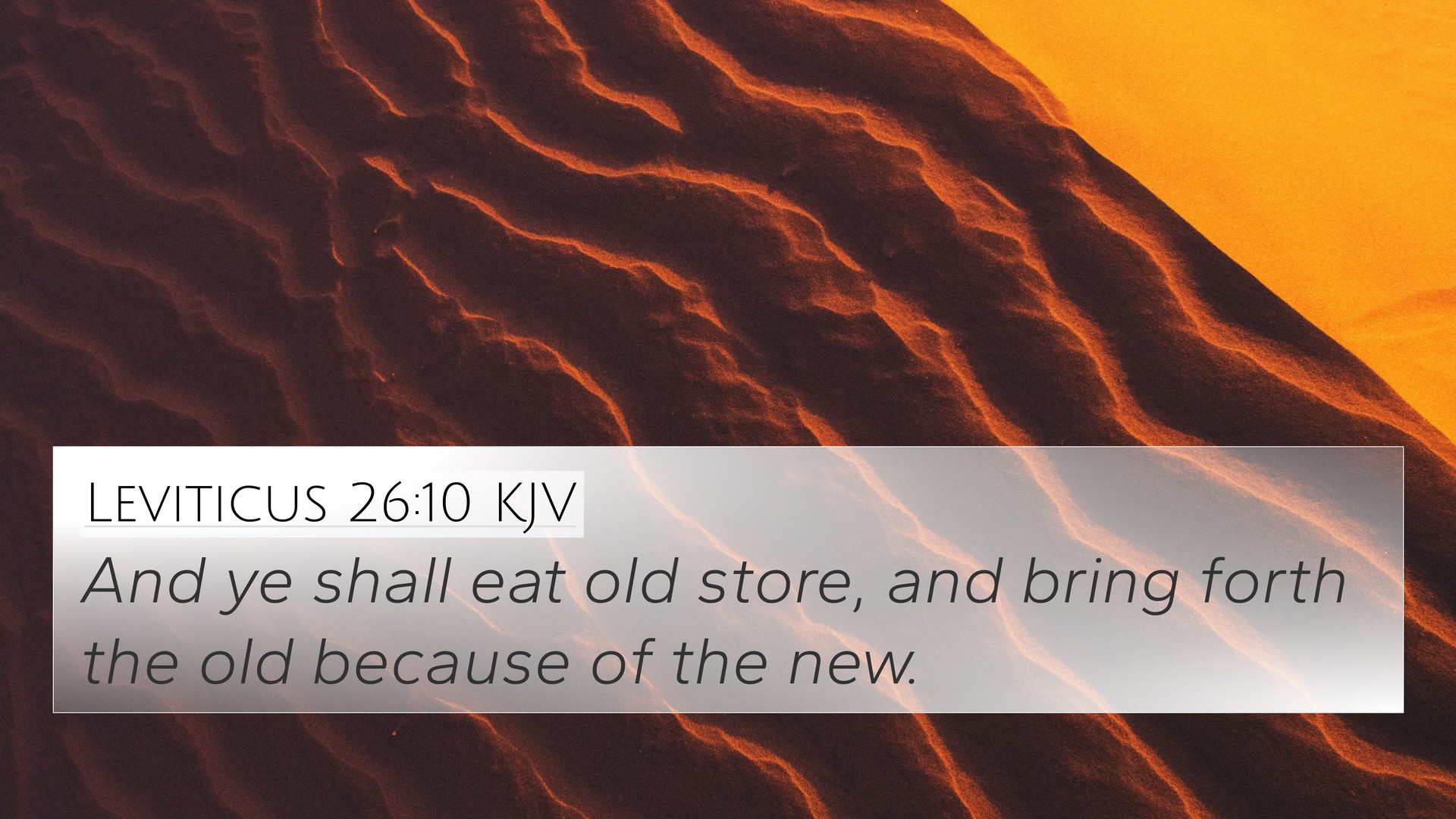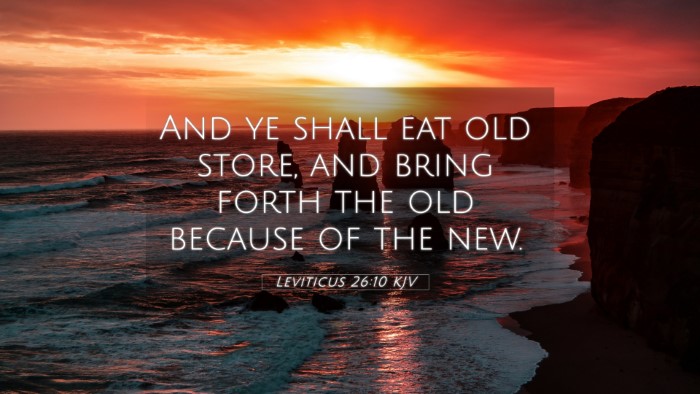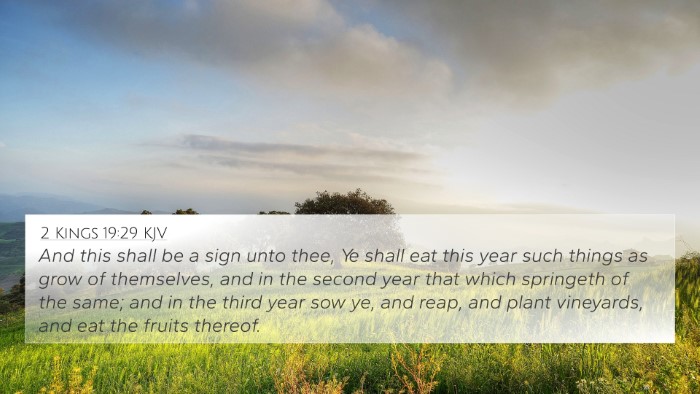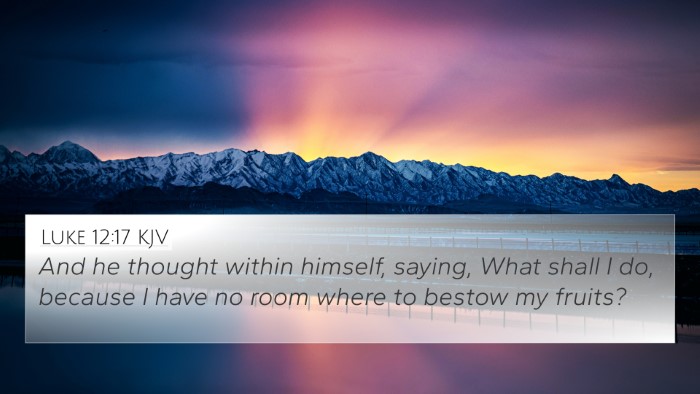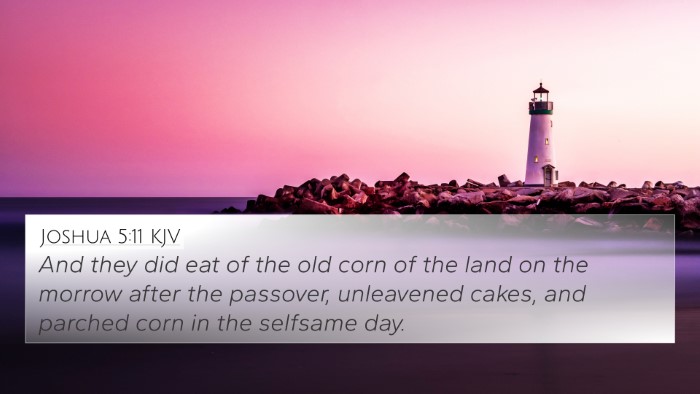Understanding Leviticus 26:10
Leviticus 26:10 states, "And ye shall eat old store, and bring forth the old because of the new." This verse conveys a profound message regarding divine provision and the transition from the old to the new. It emphasizes God's faithfulness in supplying needs while inviting His people to embrace change and progress.
Commentary Insights
This exploration combines insights from Matthew Henry, Albert Barnes, and Adam Clarke to provide a well-rounded understanding of this verse.
-
Matthew Henry's Commentary
Henry reflects on the significance of God's abundant provision. He notes that the "old store" symbolizes past blessings and resources, while the "new" represents ongoing divine favor. This highlights a continuity in God's blessings—what was once sufficient will still serve, but believers are encouraged to look expectantly for what lies ahead.
-
Albert Barnes' Commentary
Barnes emphasizes the idea of spiritual abundance. He interprets the phrase as a reminder that spiritual sustenance comes from God and that the faithful may utilize their experiences and previous blessings while also being open to receiving fresh revelations from God. The verse teaches trust in God's provision, both past and present.
-
Adam Clarke's Commentary
Clarke provides a historical perspective, suggesting that the Israelites, having been in the wilderness, would rely on the old supplies until new crops were harvested. This not only reflects God's logistical provision but also symbolizes spiritual maturation. The faithful should value their spiritual heritage while embracing growth and new lessons from God.
Connections to Other Bible Verses
Leviticus 26:10 can be cross-referenced with several other scriptures to enhance understanding and reveal thematic connections:
- Deuteronomy 8:3: "And he humbled thee, and suffered thee to hunger, and fed thee with manna, which thou knewest not, neither did thy fathers know; that he might make thee know that man doth not live by bread only, but by every word that proceedeth out of the mouth of the Lord doth man live." - This verse illustrates reliance on God's provision.
- Isaiah 43:18-19: "Remember ye not the former things, neither consider the things of old. Behold, I will do a new thing; now it shall spring forth; shall ye not know it?" - This shows the transition from old to new and God's promise of new beginnings.
- John 14:13-14: "And whatsoever ye shall ask in my name, that will I do, that the Father may be glorified in the Son. If ye shall ask any thing in my name, I will do it." - A promise of provision by faith in Christ, connecting past needs to present requests.
- 2 Corinthians 5:17: "Therefore if any man be in Christ, he is a new creature: old things are passed away; behold, all things are become new." - This verse emphasizes the new life in faith when one believes in Christ.
- Philippians 4:19: "But my God shall supply all your need according to his riches in glory by Christ Jesus." - A reassurance of God's continued provision, paralleling the themes in Leviticus.
- Hebrews 8:13: "In that he saith, A new covenant, he hath made the first old. Now that which decayeth and waxeth old is ready to vanish away." - This demonstrates the transition from old covenants to new promises in Christ.
- Revelation 21:5: "And he that sat upon the throne said, Behold, I make all things new. And he said unto me, Write: for these words are true and faithful." - This encapsulates God's promise of renewal and the joy of new creation.
Thematic Reflections
The themes arising from Leviticus 26:10 lead to several significant understandings:
- God's Faithfulness: The verse reassures believers of God's steadfast provision amid change.
- Spiritual Growth: Just as one consumes old provisions, believers must draw from their past blessings while anticipating new spiritual revelations.
- Transformation: This calls to mind the continuous transformation in faith and reliance on God's guidance in times of transition.
Concluding Thoughts
In conclusion, Leviticus 26:10 illustrates how God invites His people to cherish their past blessings while embracing the future. Through careful cross-referencing with other scriptures, believers can gain deeper insights into God's overarching themes of provision, transformation, and faithfulness.
For those seeking to explore Bible verses and their connections, utilizing tools for cross-referencing can greatly enhance one’s understanding of scripture. A Bible concordance and a guide to cross-references can serve as valuable resources for delving deeper into the biblical text.
